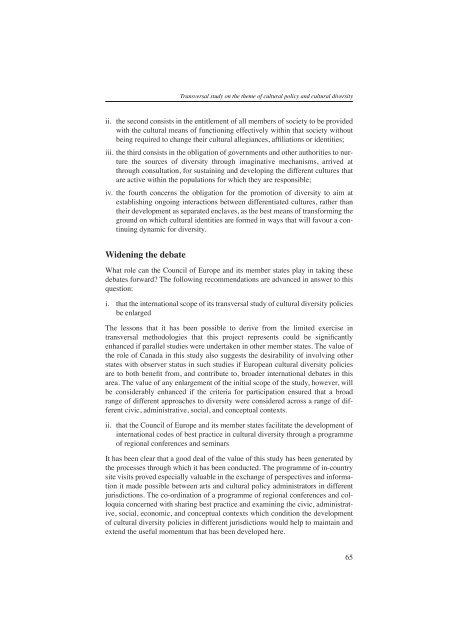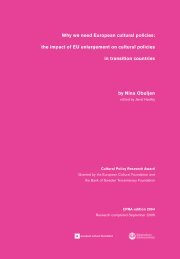<strong>Differing</strong> <strong>diversities</strong>My point, then, is that, in thinking about the role that cultural policies can play inthe development <strong>of</strong> cultural diversity, it is necessary to have the long term in view,for it is only over the long term that the powerfully divisive ways in which the relationsbetween different peoples and cultures have been organised in the histories<strong>of</strong> nationalism and colonialism can be overcome. This has been partly a matter <strong>of</strong>the ways in which the relations between different peoples and cultures has beenrepresented in western societies. It has equally, though, and just as persistently,been a matter <strong>of</strong> the ways in which such differences in representation have beentranslated into, and helped to justify, significant inequalities <strong>of</strong> civic status andtreatment.It seems likely that, in this respect, some roads here will prove longer than others.While, as we have noted, there are similarities between what we have characterisedas sub- or multinational, autochthonous, diasporic, and indigenous claimsto difference, the situation <strong>of</strong> immigrants – and especially, in <strong>Europe</strong>, <strong>of</strong> non-<strong>Europe</strong>an Union immigrants, strangers from afar – is the most precarious in all <strong>of</strong>the countries surveyed. It seems unlikely, moreover, that significant advances willbe made in strengthening the relations between cultural democracy and culturaldiversity here without putting questions <strong>of</strong> citizenship clearly and firmly at theircentre.The perspective <strong>of</strong> cultural democracyIt is questions <strong>of</strong> these kinds concerning the relations between cultural diversityand citizenship that properly belong at the centre <strong>of</strong> current debates about culturaldemocracy where, as we have noted, they meet similar claims to difference arisingfrom the histories <strong>of</strong> related oppressions in the fields <strong>of</strong> gender, sexual preference,and disability. These too, <strong>of</strong> course, have their specific properties which need to befully attended to in the fine grain <strong>of</strong> cultural policies related to their specific needs.But there is also much to be gained from looking at their intersections, for there islittle doubt that the oppressions <strong>of</strong> women, gays, lesbians, disabled people, andnon-white ethnicities have, in varied complex ways, underwritten and supportedeach other, especially as bases for the unequal distribution <strong>of</strong> civic rights and entitlements.Indeed, it is only from the perspective <strong>of</strong> these intersections that the vocabulary <strong>of</strong>citizenship can be reshaped in ways that reflect the shift – mostly still a demandrather than an accomplished reality – from polities based on the normative principle<strong>of</strong> homogeneity to ones based on the principle <strong>of</strong> heterogeneity. The pursuit <strong>of</strong>full and equal political citizenship rights is, <strong>of</strong> course, a central aspect <strong>of</strong> such concerns.There is, however, also a need for a clear understanding <strong>of</strong> the principles <strong>of</strong>cultural citizenship that also need to be secured. Four principles are <strong>of</strong> paramountimportance in developing such a revised vocabulary <strong>of</strong> citizenship.i. the first consists in the entitlement to equal opportunity to participate in the fullrange <strong>of</strong> activities that constitute the field <strong>of</strong> culture in the society in question;64
Transversal study on the theme <strong>of</strong> cultural policy and cultural diversityii. the second consists in the entitlement <strong>of</strong> all members <strong>of</strong> society to be providedwith the cultural means <strong>of</strong> functioning effectively within that society withoutbeing required to change their cultural allegiances, affiliations or identities;iii. the third consists in the obligation <strong>of</strong> governments and other authorities to nurturethe sources <strong>of</strong> diversity through imaginative mechanisms, arrived atthrough consultation, for sustaining and developing the different cultures thatare active within the populations for which they are responsible;iv. the fourth concerns the obligation for the promotion <strong>of</strong> diversity to aim atestablishing ongoing interactions between differentiated cultures, rather thantheir development as separated enclaves, as the best means <strong>of</strong> transforming theground on which cultural identities are formed in ways that will favour a continuingdynamic for diversity.Widening the debateWhat role can the <strong>Council</strong> <strong>of</strong> <strong>Europe</strong> and its member states play in taking thesedebates forward? The following recommendations are advanced in answer to thisquestion:i. that the international scope <strong>of</strong> its transversal study <strong>of</strong> cultural diversity policiesbe enlargedThe lessons that it has been possible to derive from the limited exercise intransversal methodologies that this project represents could be significantlyenhanced if parallel studies were undertaken in other member states. The value <strong>of</strong>the role <strong>of</strong> Canada in this study also suggests the desirability <strong>of</strong> involving otherstates with observer status in such studies if <strong>Europe</strong>an cultural diversity policiesare to both benefit from, and contribute to, broader international debates in thisarea. The value <strong>of</strong> any enlargement <strong>of</strong> the initial scope <strong>of</strong> the study, however, willbe considerably enhanced if the criteria for participation ensured that a broadrange <strong>of</strong> different approaches to diversity were considered across a range <strong>of</strong> differentcivic, administrative, social, and conceptual contexts.ii. that the <strong>Council</strong> <strong>of</strong> <strong>Europe</strong> and its member states facilitate the development <strong>of</strong>international codes <strong>of</strong> best practice in cultural diversity through a programme<strong>of</strong> regional conferences and seminarsIt has been clear that a good deal <strong>of</strong> the value <strong>of</strong> this study has been generated bythe processes through which it has been conducted. The programme <strong>of</strong> in-countrysite visits proved especially valuable in the exchange <strong>of</strong> perspectives and informationit made possible between arts and cultural policy administrators in differentjurisdictions. The co-ordination <strong>of</strong> a programme <strong>of</strong> regional conferences and colloquiaconcerned with sharing best practice and examining the civic, administrative,social, economic, and conceptual contexts which condition the development<strong>of</strong> cultural diversity policies in different jurisdictions would help to maintain andextend the useful momentum that has been developed here.65
- Page 5 and 6:
PrefaceThe present text constitutes
- Page 7:
Part IDiffering diversities:transve
- Page 11 and 12:
The study: background, contextand m
- Page 13 and 14: Transversal study on the theme of c
- Page 15: Transversal study on the theme of c
- Page 18: Differing diversitiesi. new forms o
- Page 23 and 24: IntroductionTransversal perspective
- Page 25 and 26: Transversal study on the theme of c
- Page 27 and 28: The challenge of diversityCulture,
- Page 29 and 30: Transversal study on the theme of c
- Page 31 and 32: Transversal study on the theme of c
- Page 33 and 34: Diversity, citizenship, and cultura
- Page 35 and 36: Transversal study on the theme of c
- Page 37: Transversal study on the theme of c
- Page 40 and 41: Differing diversitieslanguages. The
- Page 42 and 43: Differing diversitiesprogrammes int
- Page 45 and 46: Culture, government and diversity:p
- Page 47 and 48: Transversal study on the theme of c
- Page 49 and 50: Transversal study on the theme of c
- Page 51 and 52: Transversal study on the theme of c
- Page 53: Transversal study on the theme of c
- Page 56 and 57: Differing diversitiesin the pursuit
- Page 58 and 59: Differing diversitiesthe need for m
- Page 60 and 61: Differing diversitiescircumstances
- Page 62 and 63: Differing diversitiesclasses artist
- Page 66 and 67: Differing diversitiesiii. that the
- Page 69: Transversal study on the theme of c
- Page 73 and 74: The consequences of European media
- Page 75 and 76: Reasearch position paper 1and contr
- Page 77 and 78: Reasearch position paper 1directly
- Page 79 and 80: Reasearch position paper 1There hav
- Page 81 and 82: Reasearch position paper 1presence
- Page 83 and 84: Reasearch position paper 1Strategic
- Page 85 and 86: Reasearch position paper 1New media
- Page 87 and 88: Reasearch position paper 1Blumler,
- Page 89 and 90: Reasearch position paper 1Hoffmann-
- Page 91 and 92: Reasearch position paper 1Pauwels,
- Page 93 and 94: Assessing the implementationof cult
- Page 95 and 96: Reasearch position paper 2tics abou
- Page 97 and 98: Reasearch position paper 2Act (GPRA
- Page 99 and 100: Reasearch position paper 2factually
- Page 101 and 102: Reasearch position paper 2The evalu
- Page 103 and 104: Reasearch position paper 2capacity
- Page 105 and 106: Reasearch position paper 2Luchtenbe
- Page 107 and 108: The cultural policies of the Europe
- Page 109 and 110: Reasearch position paper 3went, wou
- Page 111 and 112: Reasearch position paper 3The histo
- Page 113 and 114: Reasearch position paper 3integrati
- Page 115 and 116:
Reasearch position paper 3of differ
- Page 117 and 118:
Reasearch position paper 3European
- Page 119 and 120:
Reasearch position paper 3voice to
- Page 121:
Reasearch position paper 3Howe, Mar
- Page 124 and 125:
Differing diversitiesContemporary d
- Page 126 and 127:
Differing diversitiesWhereas in the
- Page 128 and 129:
Differing diversitiesbuilding on th
- Page 130 and 131:
Differing diversitieswhen tackling
- Page 132 and 133:
Differing diversitiesand that is pr
- Page 134 and 135:
Differing diversitiesSennett, Richa
- Page 136 and 137:
Differing diversitiesallowing their
- Page 138 and 139:
Differing diversitiesNevertheless,
- Page 140 and 141:
Differing diversitiesgrowth also ex
- Page 142 and 143:
Differing diversitiesAt a deeper le
- Page 144 and 145:
Differing diversitiesconventional c
- Page 146 and 147:
Differing diversitiesworks, and the
- Page 148 and 149:
Differing diversitiesNational sover
- Page 150 and 151:
Differing diversitiesSimilarly, at
- Page 152 and 153:
Differing diversitiesCoombe, Rosema
- Page 154 and 155:
Differing diversitiesWoodmansee, Ma
- Page 156 and 157:
Differing diversitiesIndeed, which
- Page 158 and 159:
Differing diversitiesThe second maj
- Page 160 and 161:
Differing diversitiesexample by Hol
- Page 162 and 163:
Differing diversitiesincreased broa
- Page 164 and 165:
Differing diversities“Black Carib
- Page 166 and 167:
Differing diversitiesBunt, Gary, 19
- Page 169 and 170:
Preserving cultural diversity throu
- Page 171 and 172:
Reasearch position paper 7unique, t
- Page 173 and 174:
Reasearch position paper 7legislati
- Page 175 and 176:
Reasearch position paper 7appropria
- Page 177 and 178:
Reasearch position paper 7Indeed, m
- Page 179 and 180:
Reasearch position paper 7- means t
- Page 181 and 182:
Reasearch position paper 7cyberspac
- Page 183 and 184:
Reasearch position paper 7extended
- Page 185 and 186:
Reasearch position paper 7It is rec
- Page 187 and 188:
Reasearch position paper 7lose loca
- Page 189 and 190:
Reasearch position paper 7six proje
- Page 191 and 192:
Reasearch position paper 7and innov
- Page 193 and 194:
Reasearch position paper 7Programme
- Page 195 and 196:
Reasearch position paper 7Reference
- Page 197 and 198:
Reasearch position paper 7Papers on
- Page 199:
Reasearch position paper 7Swaminath
- Page 202:
Sales agents for publications of th














